Lesson 1
新概念英语第二册_lesson_1
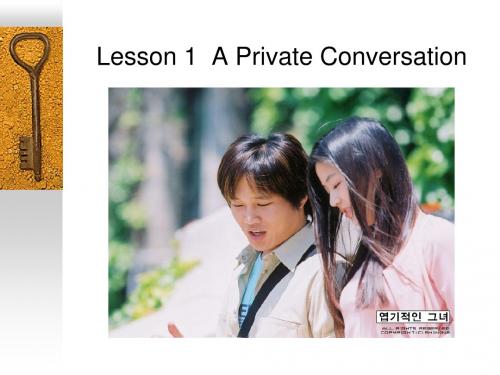
attention
[经典用法] pay attention to sb/sth
[比较学习]
notice
不用心去看 attention 用心去盯着 [口语应用] Attention, please! 请大家注意! Attention! 立正! At ease! 放松!
1. Last week I went to the theatre.
[参考翻译] 上个星期,我去了戏院看戏。
[语言点1] 时间状语开门见山,过去的时
间用过去时态顺理成章。故将go改为 went。 [语言点2] 在theatre,cinema,pictures等词 之前一定要加定冠词the。
3. The play was very interesting.
[参考翻译] 那场戏剧演得非常有意
思。 [语言点] very 为副词,interesting为 形容词,副词修饰形容词一般放在 其前面。 比如: very hot非常热, quiet easy 十分简单,但good enough 为例外。
with sb I had a long conversation with my father yesterday afternoon. have a conversation about sth Shall we have a conversation about your vacation ?
例如:
go to the theatre = go to the play去看戏 go to the cinema 去看电影(英式英语) go to the movies 去看电影(美式英语) go to the pictures/films 去看电影 be at the theatre/cinema 在戏院看戏/在
英语学习 Lesson1
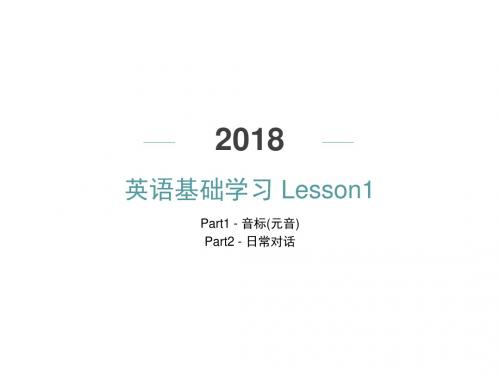
Part1 音标 - 双元音(饱满夸张)
合口双元音(第二组成部分为/ɪ/和/ʊ/): 1. [eɪ] A音:舌尖轻抵下齿,口型从半开到合 day [deɪ] 天,age [eɪdʒ] 年龄, pay [peɪ] 支付 2. [aɪ] I音:嘴型长大,发音饱满 eye [aɪ] 眼睛,like [laɪk] 喜欢,my [maɪ] 我的 3. [əʊ] O音:嘴型张开成圆形 old [əʊld] 老的,open ['əʊp(ə)n] 打开,cold [kəʊld] 冷的 4. [aʊ] 啊呜音:先张嘴成大圆 然后小圆 house [haʊs] 房子,now [naʊ] 现在,allow [ə'laʊ] 允许
8. [ʊə] 呜儿音:嘴型从微圆到张开 tour [tʊə] 旅游,sure [ʃʊə] 确信的,cure [kjʊə] 治愈
Part2 日常对话
• 名字:name • 工作:job
[neɪm]
[dʒɒb]
• 兴趣爱好:hobby
['hɒbɪ]
Part2 日常对话
1. 你叫什么名字? What’s your name? May I have your name, please? 1. 我的名字是Sherry. My name is Sherry.
2.你来自哪里? Where are you from? Where do you come from?
2. 我来自河南。 I am from Henan. I come from Henan.
Part2 日常对话
3. 你是做什么工作的? What’s your job? What do you do? 4. 你的兴趣爱好是什么? What’s your hobby?
lesson 1 课文翻译和词汇

brigade (n.): a group of people organized to function。。"unit in some work(组织起来执行某种任务的)队
scramble (v.): climb,crawl,or clamber hurriedly爬行;攀(登)
sanctuary (n.): a place of refuge or protection:asylum 避难所,庇护所 cedar (n.): any of a genus of widespreading coniferous trees of the pine family,having clusters of needlelike leaves,cones, and durable wood with a characteristic fragrance雪松(属)
和枕头给几个小一点的孩子。他想把全家人都集中在同一层楼上。"不要靠近窗户!"他警告说,担心在飓风巾震破的玻璃碎片会飞来伤人。风凶猛地咆哮起来?屋子开始漏雨了……那雨水好像能穿墙透壁,往屋里直灌。一家人都操起拖把、毛巾、盆罐和水桶,展l开了一场排水战。到八点半钟,电没有了。柯夏克老爹便启动了小发电机。
新概念1 lesson 1
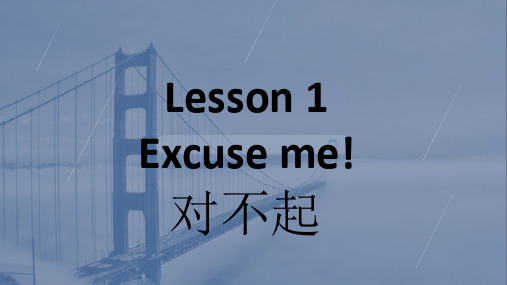
形容词性物主代词:表示一种所属关系。
对应汉语里面的“我的”“我们的”“你的”“你 们的”“ta的”“ta们的”
使用形容词性物主代词
你的短裙: your skirt 我的钢笔: my pen
Is this your handbag?
指示代词this:这,这里 th: [ð] 句型This is... :这是... e.g. This is a car. 这是一辆小汽车。
a lot: 非常地,十分地
Review
1. Excuse & sorry
2. handbag(失去爆破)
3. 人称代词主格,宾格,形容词性物主代词
主格
宾格
形容词性物主代词
I
me
my
we
us
our
you
you
your
he
him
his
she
her
her
it
it
its
they
them
their
4. This is.../ Is this...?
Is this your...? 这是你的...?
pen 钢笔 pencil 铅笔 book 书 watch 手表
dress 连衣裙 car 小汽车 house 二人称:you 第三人称:
he,she,it,they
宾格 me, us you
him,her,it,them
e.g. Glad to meet you.
ɡlad:adj.高兴的 [ɡlæd] Glad to [d] [t]失去爆破
pardon
int. interjection: 感叹词
int.原谅,请 常用在以下情况中: 再说一遍 有人跟你说话,你没
Lesson 1
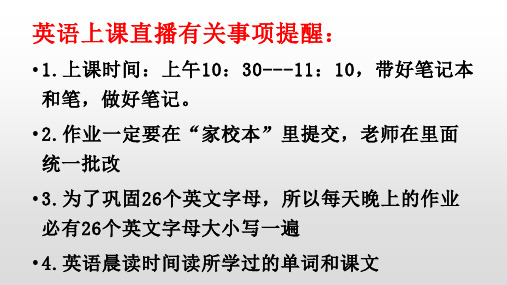
课堂小测
• 一、补全单词。
sh_ _ p co_ _ ig far_ e_
• 二、单项选择。
• ( ) 1. There are three ________.
• A. sheeps
B. a sheep
C. sheep
• ( ) 2. I have ________ apple.
• A. a
B. an
单词回顾
• farm 农场 • farmer 农民 • pig 猪 • cow 母牛:奶牛 • sheep 羊:绵羊 • a(an) 一;一个
在农场里
Li Ming:这是什么? Danny:它是一只绵 羊。 Danny:这是什么? Li Ming:它是一头 猪。
Homework(家庭作业) 1.26个英文字母一遍 2.所讲课文抄写两英一汉,并朗读
• ( ) 5. — Whis a cow.
• A. It’s
B. It
C. Its
• 三、判断下列句子与图片是(T)否(F)相符。
• ( ) 1. This is a farm.
( ) 2. This is a farmer.
•
• ( ) 3. It’s a sheep.
英语上课直播有关事项提醒:
• 1.上课时间:上午10:30---11:10,带好笔记本 和笔,做好笔记。 • 2.作业一定要在“家校本”里提交,老师在里面 统一批改 • 3.为了巩固26个英文字母,所以每天晚上的作业 必有26个英文字母大小写一遍 • 4.英语晨读时间读所学过的单词和课文
农场里的动物们
( ) 4. It’s a pig.
C. /
• ( ) 3. He is a ________.
Lesson 1 课文参考译文
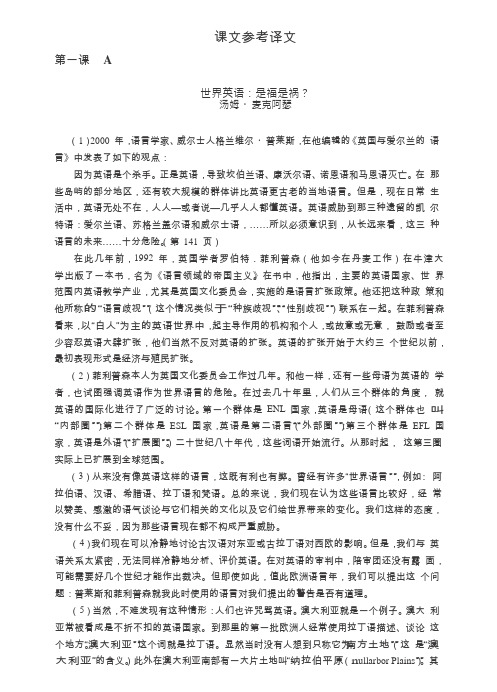
课文参考译文第一课A世界英语:是福是祸?汤姆·麦克阿瑟(1)2000 年,语言学家、威尔士人格兰维尔·普莱斯,在他编辑的《英国与爱尔兰的语言》中发表了如下的观点:因为英语是个杀手。
正是英语,导致坎伯兰语、康沃尔语、诺恩语和马恩语灭亡。
在那些岛屿的部分地区,还有较大规模的群体讲比英语更古老的当地语言。
但是,现在日常生活中,英语无处不在,人人—或者说—几乎人人都懂英语。
英语威胁到那三种遗留的凯尔特语:爱尔兰语、苏格兰盖尔语和威尔士语,……所以必须意识到,从长远来看,这三种语言的未来……十分危险。
(第141 页)在此几年前,1992 年,英国学者罗伯特.菲利普森(他如今在丹麦工作)在牛津大学出版了一本书,名为《语言领域的帝国主义》。
在书中,他指出,主要的英语国家、世界范围内英语教学产业,尤其是英国文化委员会,实施的是语言扩张政策。
他还把这种政策和他所称的“语言歧视”(这个情况类似于“种族歧视”、“性别歧视”)联系在一起。
在菲利普森看来,以“白人”为主的英语世界中,起主导作用的机构和个人,或故意或无意,鼓励或者至少容忍英语大肆扩张,他们当然不反对英语的扩张。
英语的扩张开始于大约三个世纪以前,最初表现形式是经济与殖民扩张。
(2)菲利普森本人为英国文化委员会工作过几年。
和他一样,还有一些母语为英语的学者,也试图强调英语作为世界语言的危险。
在过去几十年里,人们从三个群体的角度,就英语的国际化进行了广泛的讨论。
第一个群体是ENL 国家,英语是母语(这个群体也叫“内部圈”);第二个群体是ESL 国家,英语是第二语言(“外部圈”);第三个群体是EFL 国家,英语是外语(“扩展圈”)。
二十世纪八十年代,这些词语开始流行。
从那时起,这第三圈实际上已扩展到全球范围。
(3)从来没有像英语这样的语言,这既有利也有弊。
曾经有许多“世界语言”,例如:阿拉伯语、汉语、希腊语、拉丁语和梵语。
总的来说,我们现在认为这些语言比较好,经常以赞美、感激的语气谈论与它们相关的文化以及它们给世界带来的变化。
lesson 1
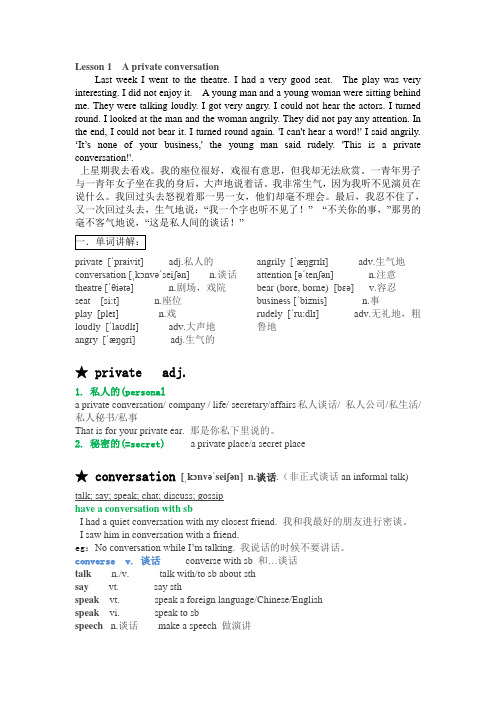
Lesson 1 A private conversationLast week I went to the theatre. I had a very good seat. The play was very interesting. I did not enjoy it. A young man and a young woman were sitting behind me. They were talking loudly. I got very angry. I could not hear the actors. I turned round. I looked at the man and the woman angrily. They did not pay any attention. In the end, I could not bear it. I turned round again. 'I can't hear a word!' I said angrily. ‘It’s none of your business,' the young man said rude ly. 'This is a private conversation!'.上星期我去看戏。
我的座位很好,戏很有意思,但我却无法欣赏。
一青年男子与一青年女子坐在我的身后,大声地说着话。
我非常生气,因为我听不见演员在说什么。
我回过头去怒视着那一男一女,他们却毫不理会。
最后,我忍不住了,又一次回过头去,生气地说:“我一个字也听不见了!” “不关你的事,”那男的毫不客气地说,“这是私人间的谈话!”private [ˈpraivit] adj.私人的conversation [ˌkɔnvəˈseiʃən] n.谈话theatre [ˈθiətə] n.剧场,戏院seat [si:t] n.座位play [pleɪ] n.戏loudly [ˈlaʊdlɪ] adv.大声地angry [ˈæŋɡri]adj.生气的angrily [ˈæŋgrɪlɪ] adv.生气地attention [əˈtenʃən] n.注意bear (bore, borne) [bɛə] v.容忍business [ˈbiznis] n.事rudely [ˈru:dlɪ] adv.无礼地,粗鲁地★ private adj.1. 私人的(personala private conversation/ company / life/ secretary/affairs私人谈话/ 私人公司/私生活/私人秘书/私事That is for your private ear.那是你私下里说的。
新概念英语第一册Lesson 1
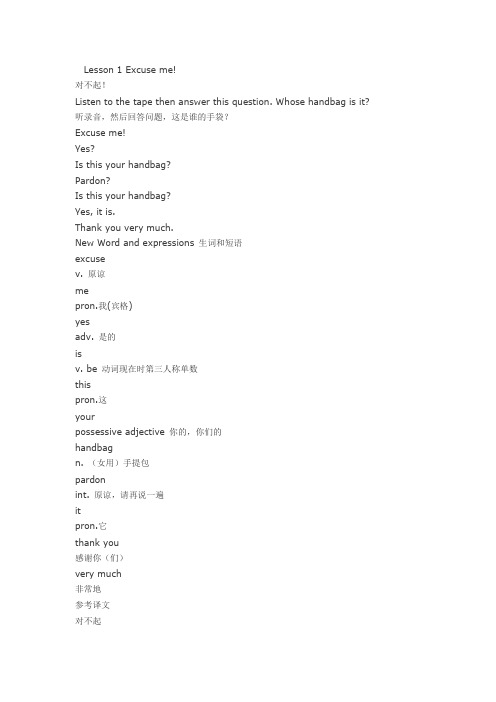
Lesson 1 Excuse me!对不起!Listen to the tape then answer this question. Whose handbag is it? 听录音,然后回答问题,这是谁的手袋?Excuse me!Yes?Is this your handbag?Pardon?Is this your handbag?Yes, it is.Thank you very much.New Word and expressions 生词和短语excusev. 原谅mepron.我(宾格)yesadv. 是的isv. be 动词现在时第三人称单数thispron.这yourpossessive adjective 你的,你们的handbagn. (女用)手提包pardonint. 原谅,请再说一遍itpron.它thank you感谢你(们)very much非常地参考译文对不起什么事?这是您的手提包吗?对不起,请再说一遍。
这是您的手提包吗?是的,是我的。
非常感谢!自学导读Excuse me!这是常用于表示道歉的客套话,相当于汉语中的"劳驾"、"对不起"。
当我们要引起别人的注意、要打搅别人或打断别人的话时,通常都可使用这一表达方式。
在课文中,男士为了吸引女士的注意而使用了这句客套话。
它也可用在下列场合:向陌生人问路,借用他人的电话,从别人身边挤过,在宴席或会议中途要离开一会儿等等。
2.Yes?什么事?课文中的Yes?应用升调朗读,意为:"什么事?"Yes?以升调表示某种不肯定或询问之意,也含有请对方说下去的意思。
3.Pardon?对不起,请再说一遍。
当我们没听清或没理解对方的话并希望对方能重复一遍时,就可以使用这一表达方式。
较为正式的说法是:I beg your pardon.I beg your pardon?Pardon me.它们在汉语中的意思相当于"对不起,请再说一遍"或者"对不起,请再说一遍好吗?" 4.Thank you very much.非常感谢!这是一句表示感谢的用语,意为"非常感谢(你)"。
Lesson1

教案:Lesson 1.《Skirt and Trousers》一、教学目标1. 知识目标:(1)学生能够听懂、会说、会读本节课的生词和重点句子。
(2)学生能够通过图片和情景,理解并运用动词“have”和“has”的正确形式。
(3)学生能够用所学词汇和句型介绍自己和他人的衣着。
2. 能力目标:(1)学生能够通过图片和情景,运用所学词汇和句型进行简单的交流。
(2)学生能够通过观察和描述,培养自己的观察力和表达能力。
3. 情感目标:(1)学生能够培养对英语学习的兴趣和热情。
(2)学生能够学会尊重他人的穿着和审美。
二、教学内容1. 词汇:skirt, trousers, dress, shorts, Tshirt, blouse, have, has2. 句型:What does he/she have on? He/She has a/an3. 情景对话:描述人物的穿着和搭配。
三、教学重点与难点1. 重点:学生能够听懂、会说、会读本节课的生词和重点句子,能够用所学词汇和句型进行简单的交流。
2. 难点:学生能够正确运用动词“have”和“has”的形式,以及描述人物穿着和搭配的能力。
四、教具与学具准备1. 教具:PPT、图片、服装道具、录音机、磁带。
2. 学具:课本、练习册、铅笔、橡皮。
五、教学过程1. 热身(5分钟)教师播放英语歌曲,引导学生跟唱,营造轻松愉快的课堂氛围。
然后,教师提问学生关于穿着的问题,如“What are you wearing today?”,引导学生用英语回答。
2. 导入(10分钟)教师通过展示图片,引入本节课的生词和句型。
教师指着图片,引导学生说出单词,如“skirt”、“trousers”等。
然后,教师引导学生用所学句型“What does he/she have on?”进行问答。
3. 新课呈现(15分钟)教师通过情景对话,展示如何用英语描述人物的穿着和搭配。
教师扮演角色,进行示范,如“She has a red skirt and a white Tshirt.”。
unit1_lesson1 词汇讲解
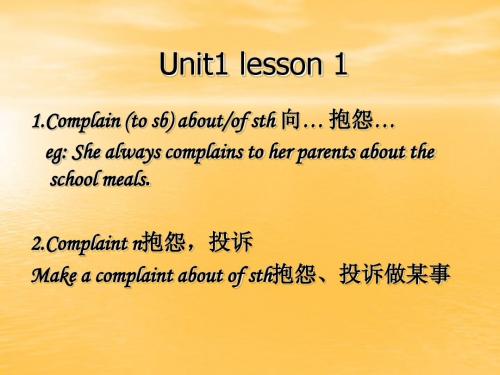
Unit1 lesson 1
at weekends=at the weekend 在周末 On weekdays 在工作日
• eg:(1)What do you do at weekends? • (2)Most school libraries are open on weekdays.
• Until 和 till 意思完全一样;口语中用till 较
多,until 在口语体以及正式文体中都使用, 且句首较常用until;二词只用于表示时间
延续性动词
瞬时性动词
7. at the moment 此刻,目前,现在 • a moment ago 刚才,片刻之前 • just a moment 等一会儿,稍等一下 • at any moment 随时 • for the moment 目前,暂时 • in a moment 立刻,马上 • for a moment 一会儿
② (否定句中,与瞬时性、短暂性动词连用)
在…以前,不到…不 He didn’t come until late in the night. ③ It was not until …that 直到…才 It was not until yesterday that we know about it.
eg:(1) Don’t interrupt him. he is at desk. (2) The family are at table.
Besides, except, except for, apart from • besides 除…之外,还有… • eg: Besides apples, there are also bananas and pears. • except 除…之外 • eg: All the students are doing homework except Lily. • except for 说明整个基本情况后,对细节加以
新概念英语三册Lesson 1

trail n. 一串,一系列
The tornado left a trail of fragments behind it. a chain of 一串,一系列
a chain of mountains/ a mountain chain 山脉
a
series of 一连串,一系列,连续的事物
1c 2i 3e 4a 5g 6h 7f 8j 9b 10d
corner disturb
cling convince
accumulate spot
somehow observe
print oblige evidence hunt
evidence
1. There was insufficient ______ to suggest that he was there at the night of the murder. 2. He has ______ quite a lot of rare books over the years. 3. The teacher ______ every mistake in my composition.
沾上污渍、斑点
The rain.
spot n. 斑点
地点
spot
for… (做)某事的地点 Our park is an ideal spot for a picnic.
I don’t mean to put you on the spot, but you have to answer the question on the spot.
I've been trying to convince Jean to come with me.
新概念英语第三册Lesson 1

3. force sb to do by law because it is a duty
4. gradually get more and more of sth
e____________
s____________ o____________ a________
同意词:
find:强调发现的结果 find out:查出事实真相 discover:做出重大发现 notice:注意到 observe:观察 watch:观察活动中的人或画面
spot
n. 斑点;地点;疙瘩
spot n.斑点 There is a white spot on the shirt. Which has spots, the leopard or the tiger?
※ in evidence 显而易见的;显眼 -- He was in evidence at the party.
There is no evidence/proof that the knife belonged to her. The room had evidence of a struggle.
Lesson 1 A Puma at Large
contents
part 1 background story part 2 words and expressions Part 3 Reading Comprehension Part 4 Grammar
contents
part 1 background story part 2 words and expressions Part 3 Reading Comprehension Part 4 Grammar
课件新概念第一册 Lesson 1 Excuse me!对不起
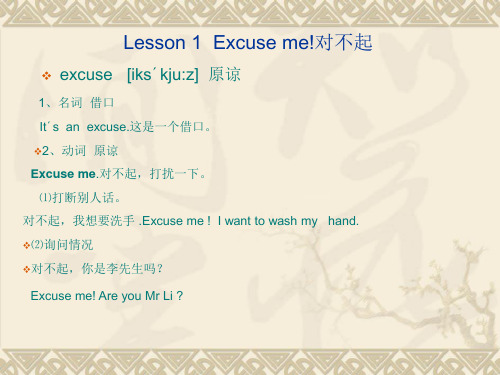
前元音:[i:] [i] [e] [æ ]
❖ [i:]-----长元音,舌头前部抬的最高,牙齿近乎 全合,舌尖抵下齿,嘴唇像两旁伸
❖
开,呈扁平型,做微笑状。
e -----me he we
ee-----see bee green need
ea-----tea eat seat lead
ie -----believe grief
❖前元音小结: 英语中有四个前元音,即:[i:] [i] [e] [æ ]
发前原因时必须注意:
①舌尖要抵住下齿。
②舌前部向硬颚部分抬起。
③双唇不要收圆,发[i:] [i] [e] 时双唇平展, 发[æ ]时口型要张大,扁唇。 ④唇形舌位保持不变,否则就要发成双元音。
Lesson 1 Excuse me!对不起
❖ excuse [iks´kju:z] 原谅
1、名词 借口 It´s an excuse.这是一个借口。 ❖2、动词 原谅 Excuse me.对不起,打扰一下。 ⑴打断别人话。 对不起,我想要洗手 .Excuse me ! I want to wash my hand. ❖⑵询问情况 ❖对不起,你是李先生吗?
I love you very much.我非常地爱你。
Lesson 1 Excuse me!对不起
❖ Lesson 1 ❖ 1 excuse [ik'skju:z] v.原谅 ❖ 2 me [mi:, mi] pron.我(宾格) ❖ 3 yes [jes] ad.是的 ❖ 4 is [iz, s, z, əz] v.be动词现在时第三人称单数 ❖ 5 this [ðis] pron.这 ❖ 6 your [jə:, jɔ:, jər, jɔ:r] 你的,你们的 ❖ 7 handbag ['hæ ndbæ g] n.(女用)手提包 ❖ 8 pardon ['pɑ:dən] int.原谅,请再说一遍 ❖ 9 it [it] pron.它 ❖ 10 thank you 感谢你(们) ❖ 11 very much 非常地
lesson 1

Describe the pictures
stomach His _________hurts.
She have got a __________. high fever
pain I have a _______in my shoulder.
She looks______, pale she is sick.
Work in pairs. Make up a dialogue.
4
Let me take your Nothing serious. I hope How long have you been temperature. Oh, you What’s wrong with you? you feel better soon. like this? have a fever.
►
2.What does Danny regret doing?
►
3.How do they get to the hospital?
►
4.What does Dr.Ling ask Danny to do?
Task two
Name
what’s wrong with him What doctor says
Choose the correct words to complete the sentences. 3 1. The boy looks so pale that there is no ___ in his face. A. colour B. fear 2. we’d better take an X-ray. With a ____ picture, the doctor will easily see the problem. A. clear B. colourful
Lesson1
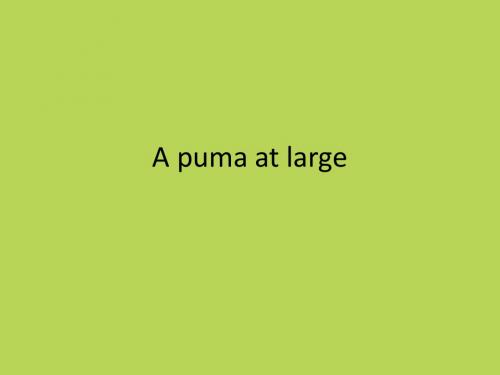
convince v. 使…信服,使…明白 You’ll need to convince them of your enthusiasm for the job.你要使他们相信你殷 切希望得到这份工作 convince sb. of sth. 使某人相信某事 How can I convince them of his honesty. 我怎样才能使你相信他是诚实的?
6. human being 人,人类 That is no way to treat another human being. 那绝对不是对待他人的方式
7. corner v.使走投无路,使陷入困境 n. 角落, 拐角处 The man was finally cornered by police in a garage.那名男子最终被警察逼到了车库里 drive\force\put sb. into a corner She was driven into a corner by the interviewer. 面试的人把她问得无言以对 be\get in\out of a tight corner陷入\摆脱困境 She’ll need luck to get out of a tight corner like that.她只有交了好运才能摆脱那样的困境
8. trail n.一串,一系列 The hurricane left a trail of destruction behind it. 飓风过后满目苍夷['hʌrɪk(ə)n] a trail of 一串,一系列 a chain of mountains\a mountain chain山脉 a chain of supermarkets\a supermarket chain连 锁超级市场 a chain of events\ideas一系列事件\一连串想 法 a series of 一连串,一系列,连续的事物
Lesson 1
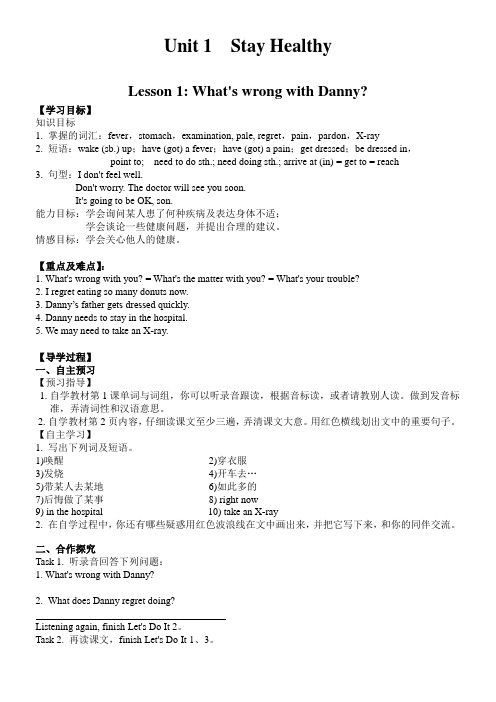
Unit 1 Stay HealthyLesson 1: What's wrong with Danny?【学习目标】知识目标1. 掌握的词汇:fever,stomach,examination, pale, regret,pain,pardon,X-ray2. 短语:wake (sb.) up;have (got) a fever;have (got) a pain;get dressed;be dressed in,point to; need to do sth.; need doing sth.; arrive at (in) = get to = reach3. 句型:I don't feel well.Don't worry. The doctor will see you soon.It's going to be OK, son.能力目标:学会询问某人患了何种疾病及表达身体不适;学会谈论一些健康问题,并提出合理的建议。
情感目标:学会关心他人的健康。
【重点及难点】:1. What's wrong with you? = What's the matter with you? = What's your trouble?2. I regret eating so many donuts now.3. Danny’s father gets dressed quickly.4. Danny needs to stay in the hospital.5. We may need to take an X-ray.【导学过程】一、自主预习【预习指导】1. 自学教材第1课单词与词组,你可以听录音跟读,根据音标读,或者请教别人读。
做到发音标准,弄清词性和汉语意思。
2. 自学教材第2页内容,仔细读课文至少三遍,弄清课文大意。
用红色横线划出文中的重要句子。
《Lesson1 》 教学设计
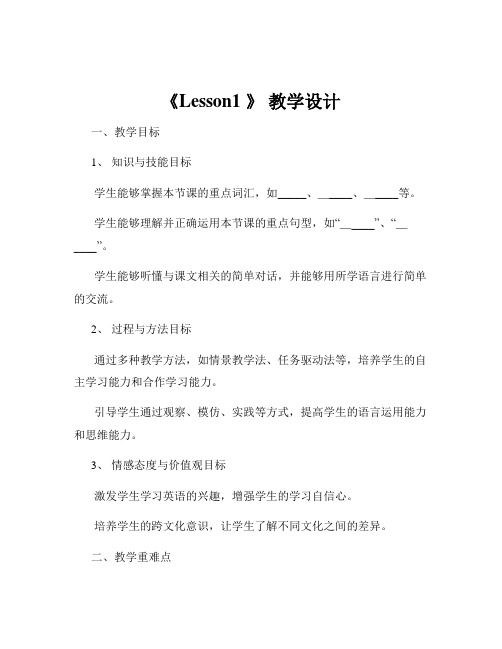
《Lesson1 》教学设计一、教学目标1、知识与技能目标学生能够掌握本节课的重点词汇,如_____、_____、_____等。
学生能够理解并正确运用本节课的重点句型,如“_____”、“_____”。
学生能够听懂与课文相关的简单对话,并能够用所学语言进行简单的交流。
2、过程与方法目标通过多种教学方法,如情景教学法、任务驱动法等,培养学生的自主学习能力和合作学习能力。
引导学生通过观察、模仿、实践等方式,提高学生的语言运用能力和思维能力。
3、情感态度与价值观目标激发学生学习英语的兴趣,增强学生的学习自信心。
培养学生的跨文化意识,让学生了解不同文化之间的差异。
二、教学重难点1、教学重点重点词汇的发音、拼写和用法。
重点句型的结构和运用。
2、教学难点如何让学生在实际情境中灵活运用所学词汇和句型进行交流。
帮助学生理解一些较难的语法点,如_____。
三、教学方法1、情景教学法创设生动有趣的情景,让学生在真实的语境中学习和运用语言。
2、任务驱动法布置明确的任务,让学生在完成任务的过程中提高语言能力。
3、游戏教学法通过游戏激发学生的学习兴趣,巩固所学知识。
4、合作学习法组织学生进行小组合作学习,培养学生的合作意识和交流能力。
四、教学过程1、导入(5 分钟)通过播放一段与本节课主题相关的英语视频或展示一些图片,引起学生的兴趣,导入新课。
2、词汇学习(10 分钟)展示本节课的重点词汇,通过图片、实物、动作等方式帮助学生理解词汇的含义。
带领学生朗读词汇,纠正发音。
让学生进行词汇拼写练习。
3、句型学习(10 分钟)呈现重点句型,讲解句型的结构和用法。
创设情境,让学生模仿例句进行句型操练。
4、课文学习(15 分钟)播放课文录音,让学生边听边理解课文内容。
逐句讲解课文,解答学生的疑问。
让学生分角色朗读课文,加深对课文的理解。
5、语言运用(15 分钟)创设真实的语言情境,如购物、旅游等,让学生运用所学词汇和句型进行对话练习。
- 1、下载文档前请自行甄别文档内容的完整性,平台不提供额外的编辑、内容补充、找答案等附加服务。
- 2、"仅部分预览"的文档,不可在线预览部分如存在完整性等问题,可反馈申请退款(可完整预览的文档不适用该条件!)。
- 3、如文档侵犯您的权益,请联系客服反馈,我们会尽快为您处理(人工客服工作时间:9:00-18:30)。
Lesson 1 周一2015/12/28 Nancy and Tina1 问候用语GreetingsHello/hi/Good bye/ Byebye/see you laterGood morning/afternoon/eveningHow are you today=(How are you doing?)--I’m fine, thank you./I’m very well.How do you do?--How do you do?Nice to meet you!--Nice to meet you, too.Excuse me!Yes?Pardon? = I beg you pardon?Here you are!Catch2 介绍自己My name is XX, I’m XX years old, I’m a teacher, and I’m Chinese.(I come from China)P104-108 对应的问句:What’s (what is) your name?How old are you?What is your job?/what are you?What is your nationality?3 介绍他人/物品This is Miss/Mrs/Mr 姓, she is 25 years old, she is a teacher and she is Chinese.Here/This is my hat, it is black.一般疑问句:Is this XX?Yes,it is/no, it isn’t / no, it is not my XX. (将Be动词提到句首)问句:what color is it?4 重点语法练习P12 P16 P201)Be 动词的变化I amYou areHe/she/itThey/we/you are2) 形容词性物主代词变化I-my, you-your, he-his,she-her,it-its,we-our, they-their5 Practice P24 P281)Is this your/my/his/her handbag/pen/pencil/book/watch/coat/dress/skirt/shirt/car/house/ umbrella/ticket/suit/school/?2)This is my sister/brother/father/mother/grandmother/grandfather/uncle/aunt/son/daughter3)He is Chinese/Japanese/French/German/Korean/English/American/Italian4)I am/he is a policeman/taxi driver/postman/nurse/mechanic/hairdresser/housewife5) 词组look at that +形容词+人Look at that fat/thin/tall/short/dirty/clean/old/Young/busy/lazy/smart/lovely/hard-working woman.6)My shirt is red,yellow,white ,black ,pink,blue,orange,green,gray.Lesson 2 2015/12/29 周二7-8:30 Nancy&Tina1 your passports please! (主谓一致)Are these your cases? / Is this your case?Yes, they are/ No, they are not=they aren’tOur cases are brown.They are thirsty/tired/light/heavy/long/small/big/2 what’s the matter? Are you all right now?3 名词变复数1)一般情况下,直接加s:officers,girls.friends,passport,tourist,employees,assistant2).以s、sh、ch、x结尾的名词,加es,如:bus-buses,class-classes,watch-watches,box-boxes,glasses3).y结尾的名词,有两种:直接加s,boy-boys,toy-toys;去y改ies,family-families,strawberry-strawberries.4).以f或fe结尾的名词,去f或fe改ves,如:housewife-housewives,knife-knives,wolf-wolves (这三个词的记忆口诀---“妻子”拿着“小刀”杀了“狼”)5).以”o"结尾的名词:(1)有生命的,加es,如:potato-potatoes,tomato-tomatoes,hero-heroes (这三个词的记忆口诀---”英雄“爱吃”土豆“和”西红柿“)(2)无生命的,加s,如:photo-photos,radio-radios.6).不规则变化的名词:man-men,woman-women,policeman-policemen,policewoman-policemen child-children, mouse-mice3 a/an P32 国际音标常见字母组合的发音4 Give me XX, which XX/one? 人称代词宾格:I-me, you-you, he-him,she-her,they-them,we-us. P 48Give me/you/him/her/them/us the empty/full/full/large/little/sharp/bluntbox/glass/cup/bottle/knife/fork/spoon5 Practice P32 P36 P40 P44Lesson 31 There is a refrigerator in the kitchen.There is a table in the middle of the room.There is a cooker on the table.There is a picture on the wall.There are some magazines on the televisionThere are some newspapers on the on the floorThere are some books one the stereo练习:P55-562 a/theThere is a cup on the table/the cup is clean.3 what must/should/can/ I do? P60Open your suitcase/Shut your mouth (身体部位:foot head face hair nose eye ear arm hand leg) Put on/take off your skirt/shoes/tieTurn on/turn off the light/tapSweep the floorClean/dust the room/deskEmpty the bottleRead this newspaper3 Where is my book? It is on the tableWhere is Nancy? She is in the garden4 what is she/he it doing? P64P66P68She is sitting under the treeHe is climbing the treeIt is running across the grass/it is running after a cat.What are they doing?They are walking over the bridgeMr Li and his wife are looking at the clouds in the sky.They are cooking/sleeping/shaving/crying/washing/flying/waiting/jumping动词的现在分词变化规则1.一般在词尾加“-ing”:climb-climbing,eat-eating,look-looking,read-reading,clean-cleaning2.以e结尾的词,先去e,再加“-ing”例如:type-typing,make-making,take-taking3. 以重读闭音节结尾,末尾只有一个辅音字母的词,要双写这个辅音字母,然后再加ing. Run-running, cut-cutting,shut-shutting,put-putting.Lesson 41 介词用法P71Our village is between two hills. (on , in , in the middle of,under, across)The tree is on the left/right of the house.The table is near the bed.We are waking along the river.The school building is besides a park.2 what are you going to do? (与现在进行时的区别P75)I’m going to paint itI’ m going to shaveI’m going to wait for a busWe’re going to do our homework3 练习:P79what are you going to do with that/those?I’m going to give/show/send/take...4 不可数名词someA pie of cheese/ a loaf of bread/a bar of soap/ a bar of chocolate/ a bottle of milk/ a pound of sugar/ a tin of tobacco(Water,sugar,milk,tea,juice,hair,coffee,bread,rice,chocolate,grass,paper,money,rain,soup,meat,beef ,fish,pork,chicken,toast,rice,food,news,)5 there is a spoon on the table. P84Is there a spoon on the table? Yes, there isThere is some water in the bottle.Is there any milk in the bottle? No there isn’tAre there any bottles on the table?6 Can you come here a minute? 练习P91Can she type this letter for me?I can’t type this letter!I can’t read it!7 Do you want any sugar? Yes, I do/No, I don’t P96P98食物单词Do you like coffee? Yes, I do/No,I don’t。
